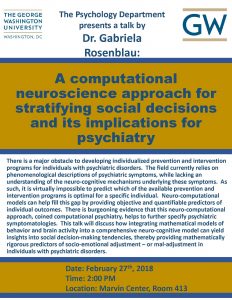Are You Biased? The Antecedents and Consequences of Racial Bias Awareness
Research Talk by: Dr. Sylvia Perry
Department of Psychology, Northwestern University
Friday, March 2nd @ 11:00 GWU Marvin Center 402-404
As the United States becomes more racially diverse, it is increasingly important to understand how this growing diversity differentially impacts racial majority and minority members’ self, interpersonal, and intergroup perceptions and experiences. In the talk I will present research that extends previous work by introducing an individual difference measure of Whites’ racial bias awareness. Across a series of studies, I demonstrate how individual differences in bias awareness relate to Whites’ (1) reactions to evidence of personal racial bias, (2) perceptions of others’ subtly biased behaviors, and (3) attitudes and behaviors toward racial minorities. I will discuss the implications of this work for intergroup relations, broadly, as well as for cross-race doctor-patient interactions, in particular. I will end by reviewing my current and future research directions that include plans to investigate the development of bias awareness, how people perceive individuals who are willing to admit (versus deny) their racial bias, and the impact of racially hostile medical school environments on Black medical students.
**Talk is part of Dean’s Lecture Series sponsored by Department of Psychology and CCAS**


